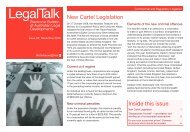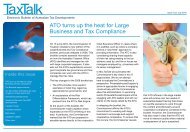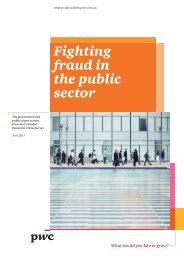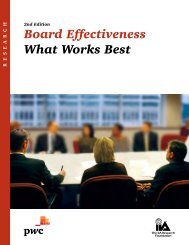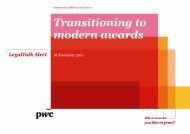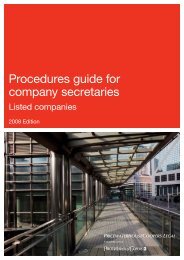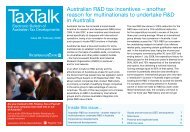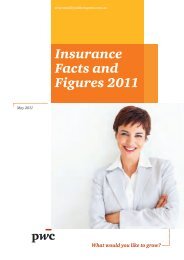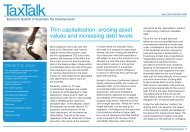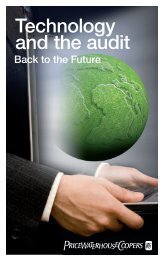Annual Review 2006 - PwC
Annual Review 2006 - PwC
Annual Review 2006 - PwC
Create successful ePaper yourself
Turn your PDF publications into a flip-book with our unique Google optimized e-Paper software.
Why?<br />
Thought<br />
Leadership.<br />
Regulatory<br />
Environment<br />
PricewaterhouseCoopers and other groups, particularly the<br />
Business Council of Australia, have for some time expressed<br />
concern about the complexity and cost of Australia’s<br />
regulatory environment.<br />
Over the past year, government responded with a number of<br />
inquiries that provided opportunities to further pursue this<br />
vital debate.<br />
In a submission to the Federal Government’s Regulation Taskforce<br />
and in a range of public forums, <strong>PwC</strong> argued against giving auditing<br />
standards the force of law and that harmonisation of Australian and<br />
overseas systems for audit regulation could be progressed without<br />
the introduction of more red tape and cost.<br />
We welcomed the release of the Taskforce’s fi nal report in August<br />
<strong>2006</strong>, especially the commitment to making it harder to introduce<br />
new rules and fi ve-yearly screening of existing regulations. Other<br />
changes to accounting methods for small business were also<br />
welcome, though CEO Tony Harrington said it was important to<br />
continue with reform.<br />
Tax<br />
Reform<br />
The fi rm also provided a submission to the Corporate and Financial<br />
Services Regulation <strong>Review</strong>, led by the Hon Chris Pearce MP.<br />
On remuneration disclosures, we argued for the requirements to<br />
be contained in one place only (the Corporations Law), and for<br />
the disclosures to be simplifi ed, separate from both the directors’<br />
report and the fi nancial report.<br />
Another major area in need of reform is tax. <strong>PwC</strong> contends<br />
that more emphasis needs to be placed on the effectiveness<br />
of our business tax regime in its entirety.<br />
At <strong>PwC</strong> we have developed a Total Tax Contribution framework,<br />
which the UK’s largest companies have deployed to better<br />
understand and enumerate their total tax contributions. Working<br />
with the Business Council of Australia (BCA) and the Corporate Tax<br />
Association (CTA), we are adapting this framework for application<br />
to Australian businesses.<br />
The Total Tax Contribution framework enables businesses to<br />
calculate their total tax contribution so that they can accurately<br />
quantify, report and manage their business taxes. Currently few<br />
companies have coordinated and comprehensive information<br />
on all their business tax payments. In our view every company<br />
should know the total amount of tax it pays.<br />
74 PricewaterhouseCoopers<br />
A proper focus on total tax contribution provides visibility to a<br />
company’s internal stakeholders on the impact of all taxes on<br />
the business and enables management to make more informed<br />
decisions. It also improves tax risk management, controls and<br />
the management of tax resources.




